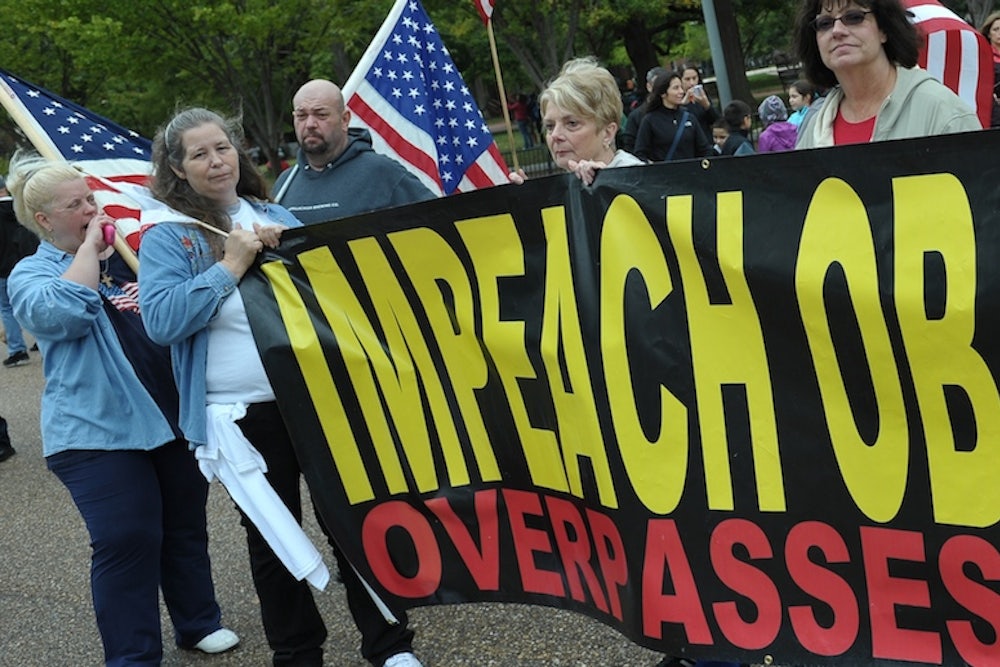The right is celebrating Ross Douthat’s Sunday New York Times column about the interlocking politics of executive action to curb deportations, and the Democratic Party’s effective efforts to troll Republicans over impeachment. Douthat goes into great detail, but you can actually boil the dynamic down to a single sentence: Democrats correctly regard impeachment as a political box canyon into which many conservatives want to march the Republican Party, and believe that maximal, unilateral action on behalf of immigrants is both an urgent priority and an effective way to exploit the tension between GOP leaders—who want to suppress impeachment talk—and hardliners, who keep resorting to immigration-related impeachment threats.
Conservatives aren’t congratulating Douthat for astutely identifying the Democrats’ political strategy, though, but for begging the question that transforms the Democratic strategy from a savvy exploitation of GOP divisions into a dangerous power play that could backfire against the president. In that regard, his article is an artifact of the current political moment, in which the right has staked so much on the premise that Obama is exceeding his executive authority on a regular basis that fallacious appeals to the legal high ground are becoming commonplace.
Douthat’s thesis rests on the assumption that aggressive executive action on behalf of certain unauthorized immigrants will by definition be “an extraordinary abuse of office…. [L]awless, reckless, a leap into the antidemocratic dark.”
These are awfully firm conclusions to draw about a policy that hasn’t been unveiled yet. But the idea is that only “a John Yoo of the left” would be able to draw up a legal justification for action of unprecedented scope, and he thus invites “honorable liberals and evenhanded moderates alike” to join him in beseeching Obama not to cross the Rubicon. Thus the idea that liberals and moderates haven’t examined the legal questions surrounding deportation is central to the fallacy. If liberals and moderates can be made to believe that Obama will be acting lawlessly, then the political strategy identified above will fall apart, because escalating calls for impeachment will no longer seem crazy and partisan.
The problem is that outside of conservative media, where basically anything Obama does without explicit, immediate congressional authorization is presumed to be illegal, reporters have consulted experts on all sides of the issue and discovered that Obama probably has a great deal, though not unlimited, authority to defer deportation of low-priority offenders. He also enjoys unchecked pardon power, which he’s unlikely to use, but which would vastly extend the limits of his ability to draw otherwise law-abiding unauthorized immigrants out of the shadows.
Despite all this, Douthat blends the assumption that Obama will be violating the law seamlessly into his column, using terms like “lawless” and “abuse of office” and by invoking Yoo as a metaphor for an unscrupulous legal man-behind-the-curtain willing to write false justifications for actions a more scrupulous lawyer would deem out of bounds. But his critique is ultimately about political norms rather than legal authority.
@ThePlumLineGS @jonathanchait I think the issue is that it's very hard to separate the legal issues from political norms here.
— Ross Douthat (@DouthatNYT) August 3, 2014Because without evidence that the scope of an executive action nobody has seen will exceed what’s permitted under the law, what he’s really arguing is that any far-reaching exercise of power in this arena will set a precedent Douthat would rather avoid. But this both a niggling point and a suspiciously limited commentary on the collapse of political norms.
For instance, Douthat shrugs off the historic dysfunction and obstructive tendencies of the GOP-controlled House with a questionable "to be sure" sentence—“Incompetence and gridlock are significant problems, indeed severe ones, but they’re happening within the context of a constitutional system that allows for — and can survive — congressional inaction.” But these two failing norms occupy two sides of the same coin: Unless you’re going to make huge assumptions about Obama’s willingness to violate the law, the only thing you can really say about Obama's intention to offer more immigrants deportation relief is that it’s symptomatic of power flowing from government actors who won’t use it (Republicans in Congress), to those who will (Democrats in the executive). And assuming Douthat isn't prepared to argue that Congress should get it together and enact the very kind of amnesty he’s been arguing against for months, it’s hard to escape the conclusion that his galvanizing concern isn’t jealousy of fragile procedural norms (the Yoo reference becomes ironic when viewed in this light) but rather his substantive opposition to the kinds of actions Obama is considering.
Douthat hints here and there in the column at the problems he sees with the concept of deportation relief, but those bones of contention are much less appetizing than the grave threat to the republic that serves as a backdrop for the entire piece. It would of course be hugely problematic if a president were allowed to get away with indiscriminate, clear-cut lawbreaking by using the press and political allies to neutralize the threat of impeachment. That’s not what we’re up against, though. And the only way to conclude otherwise is to bake an assumption that conservatives have sole claim to the legal high ground into your analysis.
But that’s a false assumption. It’s false with respect to immigration, because we don’t know what Obama’s going to do. And it’s false with respect to the latest Obamacare lawsuits, where the more honest conservative claim—that the text of the Affordable Care Act unambiguously prohibits subsidies in states that don’t set up their own exchange—is highly contestable.
This tendency to assume the legal high ground follows naturally from a political strategy of playing up unilateral executive actions as evidence of presidential lawlessness. It’s tempting and convenient for conservatives to treat these as open and shut cases. But outside the right, it’s best to view their efforts as sophisticated attempts to work the refs rather than as judicious and conclusive interpretations of fact.
